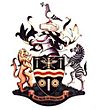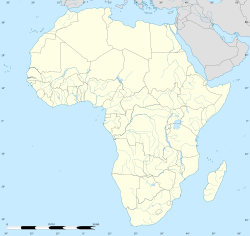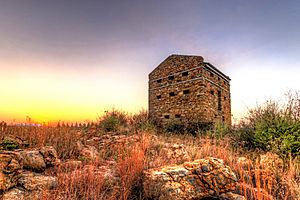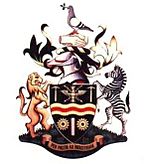Vereeniging facts for kids
Quick facts for kids
Vereeniging
|
||
|---|---|---|
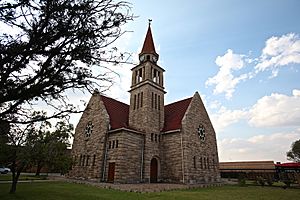
Dutch Reformed Church, Vereeniging
|
||
|
||
| Motto(s):
Per Pacem Ad Industriam
("From peace to industry") |
||
| Country | ||
| Province | Gauteng | |
| District | Sedibeng | |
| Municipality | Emfuleni | |
| Established | 1892 | |
| Area | ||
| • Total | 188.19 km2 (72.66 sq mi) | |
| Elevation | 1,479 m (4,852 ft) | |
| Population
(2020)
|
||
| • Total | 99,000 | |
| • Density | 526.1/km2 (1,362/sq mi) | |
| Racial makeup (2011) | ||
| • Black African | 55.0% | |
| • Coloured | 5.1% | |
| • Indian/Asian | 5.8% | |
| • White | 33.1% | |
| • Other | 1.0% | |
| First languages (2011) | ||
| • Afrikaans | 34.9% | |
| • Sotho | 26.2% | |
| • English | 15.5% | |
| • Zulu | 8.3% | |
| • Other | 15.2% | |
| Time zone | UTC+2 (SAST) | |
| Postal code (street) |
1930
|
|
| PO box |
1939
|
|
| Area code | 016 | |
Vereeniging is a city in the southern part of Gauteng province, South Africa. It is located where the Klip River flows into the Vaal River. Vereeniging is part of the Vaal Triangle area. The name Vereeniging comes from a Dutch word meaning "association."
Contents
Where is Vereeniging?
Vereeniging is in the southern part of the Gauteng Province. It is part of a larger urban area called the PWV conurbation. Nearby towns include Vanderbijlpark to the west and Meyerton to the north.
The city is a major industrial center in South Africa. It produces things like iron, steel, pipes, bricks, and tiles. The main languages spoken here are English, Sesotho language, and Afrikaans.
A Look at Vereeniging's Past
In 1879, a man named George William Stow searched for coal. He found a thick layer of coal on a farm called Leeuwkuil near the Vaal River. The local government at the time thought it was too far away to mine.
Later, Stow met Samuel Marks in Kimberley. Marks saw a great chance to use this coal. He wanted to power the diamond mines in Kimberley. Marks then created a company to mine the coal. He bought the farms where the coal was found.
By 1881, coal was being transported to Kimberley. So many people moved to the mining area that a new village was planned. In 1882, this village was named Vereeniging. This name was a shorter version of Marks's company name.
The Second Boer War
Vereeniging played an important role in the Second Boer War (1899–1902). The peace agreement that ended the war, called the Treaty of Vereeniging, was discussed here. Representatives from the South African Republic, the Orange Free State, and the British Empire met in Vereeniging.
During the war, the British set up a concentration camp in the area. By October 1901, it held many people, including children. Life in the camp was very hard. There was not much clean water, and conditions were difficult.
Today, a golf course and a Garden of Remembrance are located near where the camp once stood. This garden honors the British soldiers who died in the area during the war.
Apartheid Era
Near Vereeniging is the community of Sharpeville, Gauteng. This area is known for the Sharpeville massacre that happened in 1960. This event was a sad moment in South Africa's history.
Recent Times
Since 1999, Vereeniging's local services have been managed by the Emfuleni Local Municipality.
Flooding in 2011
In late 2010 and early 2011, the southern part of Gauteng had a lot of rain. This caused the nearby Vaal dam to release more water. As a result, some parts of Vereeniging and other nearby towns were flooded.
Business and Industry
The city's motto is Per Pacem ad Industriam, which means Through Peace to Industry. Vereeniging is a very important place for manufacturing in South Africa. It makes iron, steel, pipes, bricks, tiles, and processed lime.
There are also several coal mines in the area. It is believed that there are still billions of tons of coal left. Other mines nearby dig for clay, silica, and building stone. Vereeniging also has power plants that make electricity for the nearby gold mines.
Neighborhoods and Local Government
In 2001, Vereeniging had a population of 73,283 people.
Vereeniging has many different neighborhoods, including:
- Arcon Park & -Proper
- Bedworth Park
- Dickensonville
- Duncanville
- Falcon Ridge
- Homer
- Leeuhof
- Peacehaven & -Proper
- Powerville
- Randwater
- Roodt's Gardens
- Roshnee
- Sonland Park
- Spider Valley
- Springcol
- Steel Park
- Unitas Park
- Vereeniging Central
- Waldrift
Since 1999, Vereeniging has been part of the Emfuleni Local Municipality. This municipality also includes Vanderbijlpark, Sharpeville, Sebokeng, and Three Rivers.
Healthcare Services
Vereeniging offers various health services. Most of these are found in or near the main medical centers. These include:
- Vereeniging Medi-Clinic
- Kopanong Hospital
- Market-Avenue clinic
Education
Vereeniging has many schools for different age groups:
- Vereeniging Gimnasium (Afrikaans medium)
- Handhawer Laerskool (Afrikaans and English medium)
- Selborne Primary School (English medium)
- General Smuts High School (English medium)
- Arcon Park Primary School (English medium)
- Unitaspark Laerskool (Afrikaans and English medium)
- Vryheidsmonument Laerskool (Afrikaans medium)
- Overvaal Hoërskool (Afrikaans medium)
- Sonland Park Primary School (English medium)
- Phoenix High School (English medium)
- Roshnee Islamic School (English medium)
- Word of Life School (English medium)
- Krugerlaan School (Afrikaans and English medium)
Colleges and Universities
You can find campuses of these higher education institutions in or near Vereeniging:
- University of South Africa
- Damelin College
- CTU Training Solutions
- Sedibeng College
The city is also close to the North-West University's Vaal Triangle Campus and the Vaal University of Technology in Vanderbijlpark.
Famous People from Vereeniging
Many well-known people have connections to Vereeniging:
- Gerald Bosch, a famous rugby player for The Springboks.
- Bles Bridges, a popular Afrikaans country singer.
- F.W. de Klerk, a former president of South Africa, was first elected to parliament from Vereeniging.
- Francois Pienaar, a famous Springboks rugby player.
- Charl Schwartzel, a golf champion who won the 2011 US Masters.
- Tertius Bosch, Morné Morkel, and Albie Morkel, Protea cricket players, went to Vereeniging High.
- Leon Schuster, a well-known actor, comedian, and filmmaker.
- Pieter Aldrich, a professional tennis player.
Vereeniging's Coat of Arms
Vereeniging became a municipality in 1912. By 1931, the town had an emblem showing a bridge over a river and two clasped hands.
In 1955, the town council received an official coat of arms. It was later registered in 1957 and 1987.
The shield on the coat of arms is black. It shows a golden thunderbolt between two picks at the top. Below that is a wavy orange stripe with gold edges. At the bottom, there is a golden pipe between two cogwheels.
The top part of the coat of arms, called the crest, shows a dove of peace on two clasped hands. On the sides, a lion and a zebra stand on a grassy area with flowers. The motto is Per pacem ad industriam, meaning Through peace to industry.
 | Madam C. J. Walker |
 | Janet Emerson Bashen |
 | Annie Turnbo Malone |
 | Maggie L. Walker |


